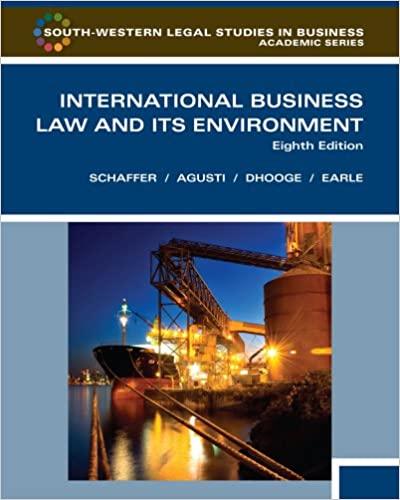Question
Two-year-old Tiffany Todd died tragically when four-year-old Cori Smith used a Bic lighter to start a fire in Tiffany's bedroom. Tiffany's estate sued the lighter
Two-year-old Tiffany Todd died tragically when four-year-old Cori Smith used a Bic lighter to start a fire in Tiffany's bedroom. Tiffany's estate sued the lighter manufacturer and the district court granted summary judgment in favor of the defendants. After rehearing the appeal en banc,1 a majority of this court concluded that the warning printed on the lighter--"KEEP OUT OF REACH OF CHILDREN"--was adequate, and that summary judgment on the issue of duty to warn was proper. However, to ensure that the law we applied on the other issues in the case was genuine state law, we certified to the Illinois Supreme Court questions which examined the proper application of the consumer contemplation test and the risk-utility test under Illinois products liability law. The Illinois Supreme Court promptly declined to answer the certified questions. These issues thus return to this court sitting en banc.
Two final issues remain for our consideration. First, Todd has appealed the district court's decision to grant summary judgment for Bic on his negligence claim. In his complaint, Todd claimed that Bic was negligent for breaching its duty to manufacture a safe lighter. It is true that manufacturers have a legal duty, under Illinois negligence and strict products liability law, to produce reasonably safe products. If the manufacturer breaches this duty, it is strictly liable; if the manufacturer breaches this duty because it failed to employ the requisite degree of care, it is also negligent. We have already determined that the lighter in question was not unreasonably dangerous. It follows that Bic did not breach its duty to produce a reasonably safe product.
Secondly, in his appellate brief, Todd claimed that the warning Bic placed on the lighter was insufficient and that the insufficiency made the lighter unreasonably dangerous. In the course of certifying this case to the Illinois Supreme Court, however, we decided the warning issue. We agreed with the district court that the warning Bic placed on the lighter was adequate as a matter of law.
CONCLUSION
The district court was correct in its conclusion that, as a matter of law, an ordinary disposable cigarette lighter is not unreasonably dangerous. Because Bic did not produce an unreasonably dangerous product, it was neither strictly liable nor negligent. Therefore, the judgment of the district court is AFFIRMED.
Question:
What are some of the reasons the court ruled in the manufactures favors?
Step by Step Solution
There are 3 Steps involved in it
Step: 1

Get Instant Access to Expert-Tailored Solutions
See step-by-step solutions with expert insights and AI powered tools for academic success
Step: 2

Step: 3

Ace Your Homework with AI
Get the answers you need in no time with our AI-driven, step-by-step assistance
Get Started


